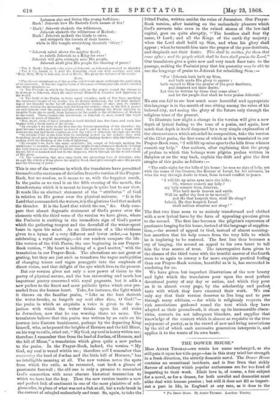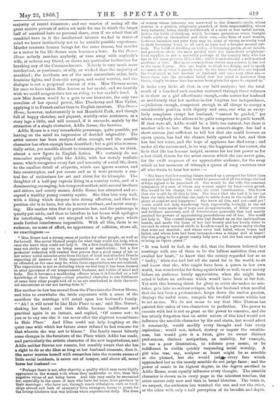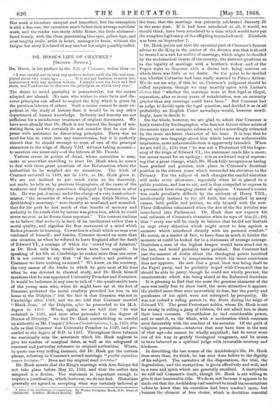THE DOWER HOUSE.*
Miss ANNIE Thomas—we retain her name unchanged, as she still puts it upon her title-page—has in this story tried her strength in a fresh direction, the strictly domestic novel. The Dower House contains no sensational incidents, and is free from that sickly flavour of adultery which popular authoresses are far too fond of imparting to their work. Illicit love is, of course, a fair subject for a novel, as for a drama, for both novelist and dramatist must alike deal with human passion ; but still it does not fill so import- ant a part in life, in England at any rate, as it does in the * The Dauer House. By Annie Thomas. London; Tinsley.
majority of recent romances ; and one wearies of seeing all the great motive powers of action set aside for one in which the larger half of mankind have no personal share, even if we admit that all mankind have in it the intellectual interest we feel in states of mind we know instinctively not to be outside possible experience. Murder interests human beings for the same reason, but murder as a motor in the life drama soon becomes a bore. In the Dower House nobody murders anybody, or runs away with anybody's wife, or seduces any friend, or shows any particular inclination for breaking any of the Commandments. Nobody is very much more intellectual, or passionate, or silly, or wicked than the majority of mankind ; the incidents are of the most naturalistic order, little feminine fights, and domestic scrapes, and social worries, and the dialogue is not a perpetual contest of wits. Miss Thomas seems for once to have taken Miss Austen as her model, and we heartily wish we could congratulate her on rising to her model's level. A new Miss Austen would be a gain to our literature, the only two novelists of her special power, Miss Thackeray and Miss Tytler, applying it to French rather than to English interiors. The Dower House, however, unfortunately is not Mansfield Park, and though full of happy sketches, and piquant, worldly-wise sentences, as a story lags a little, and will succeed, if it succeeds, mainly by the attraction of a single character, Addie Rouse, the heroine.
Addie Rouse is a very remarkable personage, quite possible, yet leaving on the mind an impression of decided originality. The artist nature has been analyzed often enough, and the sensible character has often enough been described ; but a girl who is essen- tially artist, yet sensible almost to common-placeness, is, we think, almost a new figure in English fiction. We certainly do not remember anything quite like Addie, with her sternly realistic sense, which recognizes every fact and necessity of social life, down to the smallest detail of etiquette, which can ignore worries, and face catastrophes, and yet covers and as it were protects a cen- tral fire of enthusiasm for art and thirst for its triumphs. The daughter of a half-pay captain living in a country town, and of a domineering, managing, hot-tempered mother, with several brothers and sisters, and scanty means, Addie Rouse has attracted and ac- cepted a wealthy young country squire. She likes him very well, with a liking which deepens into strong affection, and likes the position she is to have, but she is never exultant, and never annoy- ing. His mother tries first to patronize her, and the patronage is quietly put aside, and then to interfere in her house with apologies for interfering, which are accepted with a kindly grace which made further interference impossible. With all this, there is no rudeness, no sense of effort, no appearance of collision, above all, no exactingness:—
"Miss Rouse had a strong sense of justice for other people, as well as for herself. She never blamed people for what they could not help, when once she knew they could not help it. On a first reading, this tolerance may not strike any one as being unusual or meritorious ; but a few moments' reflection will remind that person that a good many of his or her minor social miseries arise from the fact of kind and attached friends expecting all manner of little impossibilities of us, and of being hurt or offended, as the case may be, when these expectations are not realized. The expectation is not so irritating when we feel that it has been formed in titter ignorance of our temperament, business, and habits of mind and body. But it becomes a maddening offence when it is founded on a full knowledge of these things—when practical obstacles to our fulfilment of some duty other people told off to us are overlooked in their theoreti- cal amazement at our not having done it."
Her mother-in-law has moved from the Place into the Dower House, and tries to overwhelm the bride expectant with a sense of the sacrifices the marriage will entail upon her husband's family.
" it will never be like Hale Place to me,' said Mrs. Burnet, shaking her head; and then Addie became indifferent and practical again in an instant, and replied, ' Of course not ; to you or to any one else it can never offer the slightest resemblance to Hale Place.' And Ellen could not help laughing at the quiet ease with which her future sister refused to feel remorse for that wherein she was not to blame." The family resent bitterly some changes in the furniture of the Place which Addie has made, and particularly the artistic character of the new importations, and Addle neither frowns nor resents, but sensibly aware that she has a right to do as she likes as long as her husband consents, does it. She never worries herself with researches into the remote causes of little social incidents, is never out of temper, and above all, never bores her husband :—
a Perhaps there is not, after chastity, a quality which men more highly appreciate in the women with whom they undertake to live, than this negative virtue of not being bores. And this may easily be accounted for, especially in the cases of men who have led home lives precious to their marriage ; who have not, through much tribulation, such as hard- ships abroad and lack of sympathy from strangers, learnt to yearn for the loving-kindness that was tedious when experienced daily. The lives of women whose interests are narrowed to the domestic circle, whose routine is a portion, religiously guarded, of their respectability, whose very industry, being chiefly needlework of a more or less useful nature, fosters the habit of thinking, which becomes pernicious when thought dwells solely on themselves and their own,—the lives of such women, however harmless and pure they may be, must of strong necessity tend to their becoming bores to all such as have had a broader mental out- look. The habit of dwelling on trifles, of becoming prolix about details, and garrulous about the most painful topic the immediate neighbour- hood supplies, is not a speciality perhaps of tho country lady who has run in the same grooves all her life ; but it is undoubtedly a well marked attribute of hers. Her more cosmopolitan sisters may possess it, but not in the same degree. She has learnt to think too deeply, and to speak too much about what is purely local. So she bores those who aro beyond the local mind, as her brother or husband and sons very often are — bores them into the mistaken belief that her mind is narrower than theirs, simply because hors has never been given the space to expand in."
It looks very little, all that, in our bald analysis ; but the total result of a hundred such touches scattered through three volumes is to show us a girl affectionate enough,—she nurses her husband so assiduously that her mother-in-law forgives her independence, —judicious enough, competent enough in all things to occupy a considerable position with dignity and ease, one who, as every- body complains except her husband, " cannot be guided," yet whom everybody also allows to be quite competent to guide herself. If that were all, Addle would be a little too natural, but there is
another side to her. She has been a concert-singer, has had a short success just sufficient to tell her that she could become an opera queen, has had the chance fairly opened to her, and then has lost her voice, and the hope of applause has died away ; and under all the success and, in its way, the happiness of her career, she feels that life has become insipid, mourns for her lost power as for a lost child, thirsts for the artist success which she can never gain, for the swift response of an appreciative audience, for the sway which in her moments of triumph a queen of song exercises over all who strain to hear her notes :-
" She knew that her coming future opened up a prospect far fairer than any past she had known. She would be possessed of all the things she had always sighed to be possessed of. She would be the wife, the constant companion of a man of whom any woman might be fond—even proud. Sho would be his charge, his care, his chief consideration. Sho know that she would be all this to him. She knew that she had it in her (at least she fully believed that she had) to settle down in the midst of this glory of comfort and happiness ! She knew all this, and yet—and yet! —she could not help wandering back regretfully, lovingly, to the old days that were made up of hope and disappointment, of bittor reverses and brilliant successes, and of feverishness generally that had nearly parched the powers of appreciating peacefulness out of her. She could not help it. The concert singer who had flashed up on the metropolitan boards, and made the fame of her fair beauty and her lovely voice to resound in every musical circle in London—and in a great many circles that wore not musical ; and whose voice had failed, whose hopes had failed, and whose love had been betrayed—was a singer still at heart! She was going to be a great county lady now ; but she had once aspired to being an Opera queen !"
" It was hard to feel, as she did, that the Burnets believed her marriage with one of them to be the loftiest ambition that ever swelled her heart," to know that the county regarded her as so " lucky," when she had lost all she cared for in the world, to sit and know that she, who might have been a queen in her own world, was wondered at for doing squire's wife so well, to act society before an audience barely appreciative, when she might have acted it before an audience which would have been at her feet. Yet with this burning thirst for glory as artist she snakes no mis- takes, gets into uo serious scrapes, tells her husband when needful that she has been a professional, keeps down the useless passion, displays the useful sense, compels the twofold nature within her to act as one. We do not mean to say that Miss Thomas has painted this union of two characters to perfection. The power to execute with her is not so great as the power to conceive, and she has utterly forgotten that an artist nature of this kind would not influence the sensible character by fits and starts, but would affect it constantly, would modify every thought and bias every aspiration ; would not, indeed, destroy or impair the sensible- ness, but would give it a twist, give its owner distinct preferences, distinct antipathies, an inability, for example, to use a poor illustration, to tolerate poor music, or be indifferent to visible quickly responding social worship. A girl who was, say, sculptor at heart might be as sensible as she pleased, but she would judok. every face which approached her as the merely sensible do no judge faces ; and the power of music in its highest degree, in the degree ascribed to Addie Rouse, must equally influence every thought. The sensible character is shown us in every page in the minutest touches, the artist nature only now and then in broad blotches. The truth is, we suspect, the authoress has watched the one and not the other, or the other with only a half perception of its breadth and depth.
Her work is therefore unequal and imperfect, but the conception is still a fine one, the execution much better than average novelists' work, and the reader can study Addie Rouse, the little alabaster- faced beauty, with the clear, penetrating blue eyes, yellow hair, and over lengthy smile, artist in heart, manager in brain, without the fatigue her story if related of any one but her might possibly inflict.




































 Previous page
Previous page